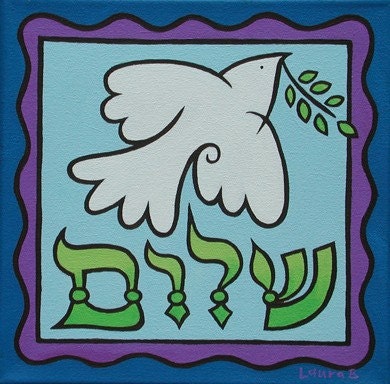Bestow peace, goodness and blessing, life, graciousness, kindness and mercy, upon us and upon all Your people Israel. Bless us, our Parent, all of us as one, with the light of Your countenance. For by the light of Your countenance You gave us, Lord our God, the Torah of life and loving-kindness, righteousness, blessing, mercy, life and peace. May it be favorable in Your eyes to bless Your people Israel, at all times and at every moment, with Your peace.
Blessed are You Lord, who blesses the people Israel with peace. May the words of my mouth and the meditation of my heart be acceptable before You, Lord, my Strength and my Redeemer.
My God, guard my tongue from evil and my lips from speaking deceitfully. Let my soul be silent to those who curse me; let my soul be as dust to all. Open my heart to Your Torah, and let my soul eagerly pursue Your commandments. As for all those who plot evil against me, hasten to annul their counsel and frustrate their design. Let them be as chaff before the wind; let the angel of the Lord thrust them away. That Your beloved ones may be delivered, help with Your right hand and answer me. Do it for the sake of Your Name; do it for the sake of Your right hand; do it for the sake of Your Torah; do it for the sake of Your holiness. May the words of my mouth and the meditation of my heart be acceptable before You, Lord, my Strength and my Redeemer.
God who makes peace in the heavens, may You make peace for us and for all Israel; and say, Amen.
May it be Your will, Lord our God and God of our parents, that the Temple be speedily rebuilt in our days, and grant us our portion in Your Torah.
שים שָׁלום טובָה וּבְרָכָה. חֵן וָחֶסֶד וְרַחֲמִים עָלֵינוּ וְעַל כָּל יִשרָאֵל עַמֶּךָ. בָּרְכֵנוּ אָבִינוּ כֻּלָּנוּ כְּאֶחָד בְּאור פָּנֶיךָ. כִּי בְאור פָּנֶיךָ נָתַתָּ לָּנוּ ה' אֱלהֵינוּ תּורַת חַיִּים וְאַהֲבַת חֶסֶד. וּצְדָקָה וּבְרָכָה וְרַחֲמִים וְחַיִּים וְשָׁלום. וְטוב בְּעֵינֶיךָ לְבָרֵךְ אֶת כָּל עַמְּךָ יִשרָאֵל בְּכָל עֵת וּבְכָל שָׁעָה בִּשְׁלומֶךָ:
בָּרוּךְ אַתָּה ה', הַמְבָרֵךְ אֶת עַמּו יִשרָאֵל בַּשָּׁלום:
יִהְיוּ לְרָצון אִמְרֵי פִי וְהֶגְיון לִבִּי לְפָנֶיךָ. ה' צוּרִי וְגואֲלִי: אֱלהַי. נְצר לְשׁונִי מֵרָע וּשפָתַי מִדַּבֵּר מִרְמָה. וְלִמְקַלְלַי נַפְשִׁי תִדּם. וְנַפְשִׁי כֶּעָפָר לַכּל תִּהְיֶה. פְּתַח לִבִּי בְּתורָתֶךָ. וּבְמִצְותֶיךָ תִּרְדּף נַפְשִׁי. וְכָל הַחושְׁבִים עָלַי רָעָה. מְהֵרָה הָפֵר עֲצָתָם
יִהְיוּ לְרָצון אִמְרֵי פִי וְהֶגְיון לִבִּי לְפָנֶיךָ. ה' צוּרִי וְגואֲלִי: אֱלהַי. נְצר לְשׁונִי מֵרָע וּשפָתַי מִדַּבֵּר מִרְמָה. וְלִמְקַלְלַי נַפְשִׁי תִדּם. וְנַפְשִׁי כֶּעָפָר לַכּל תִּהְיֶה. פְּתַח לִבִּי בְּתורָתֶךָ. וּבְמִצְותֶיךָ תִּרְדּף נַפְשִׁי. וְכָל הַחושְׁבִים עָלַי רָעָה. מְהֵרָה הָפֵר עֲצָתָם
וְקַלְקֵל מַחֲשַׁבְתָּם: עֲשה לְמַעַן שְׁמֶךָ. עֲשה לְמַעַן יְמִינֶךָ. עֲשה לְמַעַן קְדֻשָּׁתֶךָ. עֲשה לְמַעַן תּורָתֶךָ. לְמַעַן יֵחָלְצוּן יְדִידֶיךָ
הושִׁיעָה יְמִינְךָ וַעֲנֵנִי:
יִהְיוּ לְרָצון אִמְרֵי פִי וְהֶגְיון לִבִּי לְפָנֶיךָ. ה' צוּרִי וְגואֲלִי: עשה שָׁלום בִּמְרומָיו. הוּא יַעֲשה שָׁלום עָלֵינוּ וְעַל כָּל יִשרָאֵל. וְאִמְרוּ אָמֵן:
יְהִי רָצון מִלְּפָנֶיךָ ה' אֱלהֵינוּ וֵאלהֵי אֲבותֵינוּ. שֶׁיִּבָּנֶה בֵּית הַמִּקְדָּשׁ בִּמְהֵרָה בְיָמֵינוּ. וְתֵן חֶלְקֵנוּ בְּתורָתֶךָ: וְשָׁם נַעֲבָדְךָ בְּיִרְאָה כִּימֵי עולָם וּכְשָׁנִים קַדְמונִיות: וְעָרְבָה לה' מִנְחַת יְהוּדָה וִירוּשָׁלָיִם. כִּימֵי עולָם וּכְשָׁנִים קַדְמונִיות:
This extremely long brakha (blessing), called Sim Shalom, requests God for peace. Despite the fact that we ended the bakashot (requests) with Shema Koleinu and began hoda’ah (thanks) in Modim, more bakashot were put at the end to squeeze in as many as possible. We pray to be given peace throughout our lives, saved from speaking negatively of others, and for the Beit HaMikdash (Temple) to be rebuilt.
We ask God so extensively for peace because without it, we are not able to enjoy any of the blessings the Holy One has given us. Just think: if the world became an overnight utopia where women were completely equal with men, but everything in your life was going crazy, would you be able to appreciate your newfound equality?
The Chatam Sofer, a commentator, explains that the word sim in Sim Shalom represents three qualities of peace: shemen (oil), yayin (wine), and mayim (water). Torah learning is symbolized by oil, and Torah learning is the easiest way to get peace. Wine is known to cause joy, a way to find peace in life. Water is a staple of life that people have to come together to procure (think of Israel’s constant near-drought status and the solutions the country has come together to discover), a way to get peace between people.
The Jewish feminist movement could definitely use some of the above aspects of peace. While a multitude of feminist-leaning institutions of Torah learning exist, like Drisha and Midreshet Lindenbaum, there needs to be more out there. There also have to be more Torah scholars who are dedicated to finding a solution to agunah. We could also use more joy within the Jewish feminist community. Between the statistics of agunah and domestic violence, eating disorders within the community, and homosexuals’ exclusion, we need to be cheered up every once in a while. Jewish feminists also have to work harder at coming together to solve problems.
Between the controversy over Rabba Sara Hurwitz’s ordination as an Orthodox woman rabbi and her title, Women of the Wall’s leader Anat Hoffman’s arrest, and assorted other chaotic events, we could use some peaceful times where justice for women isn’t miscarried. The more we pray for peace within the women’s movement in this brakha, the more we’ll get it.
This marks the end of the Shemoneh Esrei segment of the Women in Prayer series. Look forward to feminist analyses of the Shema, Sheh'Lo Asani Isha, and other prayers!

No comments:
Post a Comment